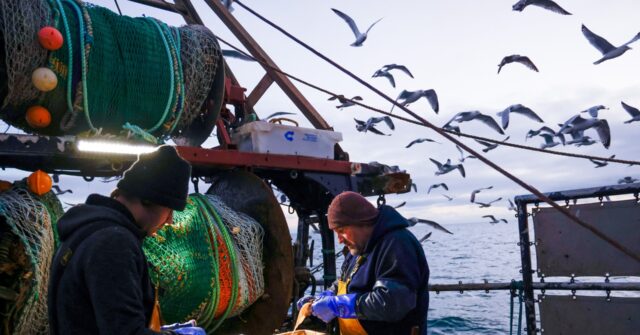The European Union (E.U.) is gearing up to assert its demands for unrestricted fishing rights in U.K. waters, a move that may involve leveraging energy supplies as a bargaining tool, according to recent reports. The situation arises from the existing Brexit arrangement that allowed E.U. fishermen partial access to U.K. coastal regions, with a gradual reduction in catch quotas planned. Over a period of five and a half years, starting from the agreement’s inception, the amount of fish allocated to E.U. fishers is set to decrease by a significant 25% by the expiration of the deal in 2026. This impending deadline has heightened tensions as both sides prepare for potential negotiations.
Brussels has expressed an interest in retaining the current fishing arrangements but, as highlighted by the Daily Telegraph, may seek to renegotiate the Trade and Cooperation Agreement if U.K. authorities grant unrestricted access to their waters. This approach indicates that the E.U. is willing to engage in a tactical negotiation strategy, where the fishing rights will be a focal point of discussions. Complicating matters, the expiry of the fishing agreement will coincide with the conclusion of a critical energy agreement that governs Britain’s access to E.U. gas and electricity markets—a pivotal factor that could significantly impact the U.K.’s energy landscape post-Brexit.
Political analysts underline the importance of these fisheries and energy provisions in the context of E.U.-U.K. relations. Anand Menon, the Director of the UK in a Changing Europe think tank, emphasizes that the simultaneous expiration of the agreements on fishing and energy is no coincidence. He posits that fisheries are not only an economic concern but also a crucial political issue within the E.U., leading to the expectation that the bloc will be highly motivated to secure continued access to British waters. In this light, the E.U. may utilize energy supplies as leverage to fortify its negotiating position regarding fishing rights.
In the current political landscape, U.K. Labour Party leader Sir Keir Starmer has faced criticism for his approach to the fishing industry. Following a meeting with European Commission President Ursula Von der Leyen, Starmer acknowledged the complexity of upcoming negotiations and identified certain areas where the party would maintain a firm stance. His comments ignited backlash from both sides of the political spectrum, with opponents expressing concern that he might concede to E.U. demands at the expense of U.K. fishing interests.
The urgency of the situation has prompted warnings from various political figures who argue that Starmer must clarify his position on fishing rights. Shadow environment spokesman Steve Barclay has explicitly urged Starmer to reject any proposals that would allow increased access to U.K. fishing waters for E.U. vessels. Meanwhile, Richard Tice, leader of Reform UK, criticized the Labour Party for allegedly neglecting the fishing industry in their policy discussions, claiming both major political parties have repeatedly let down the sector. This sentiment reflects a growing concern among stakeholders in the fishing community, who are becoming increasingly vocal about their needs and the importance of protecting U.K. interests.
As negotiations loom on the horizon, the stakes are considerable for the U.K. fishing industry and energy sector, as both sides seek to find common ground in a post-Brexit framework. The potential for a showdown over fishing and energy rights underscores the ongoing complexities of the U.K.-E.U. relationship, with each side keen to assert its claims and protect its national interests. As the expiration of pivotal agreements approaches, the political dynamics will be closely watched, with implications that may resonate far beyond fisheries and energy, affecting the broader economic and political landscape of the U.K. and its relations with the E.U.

